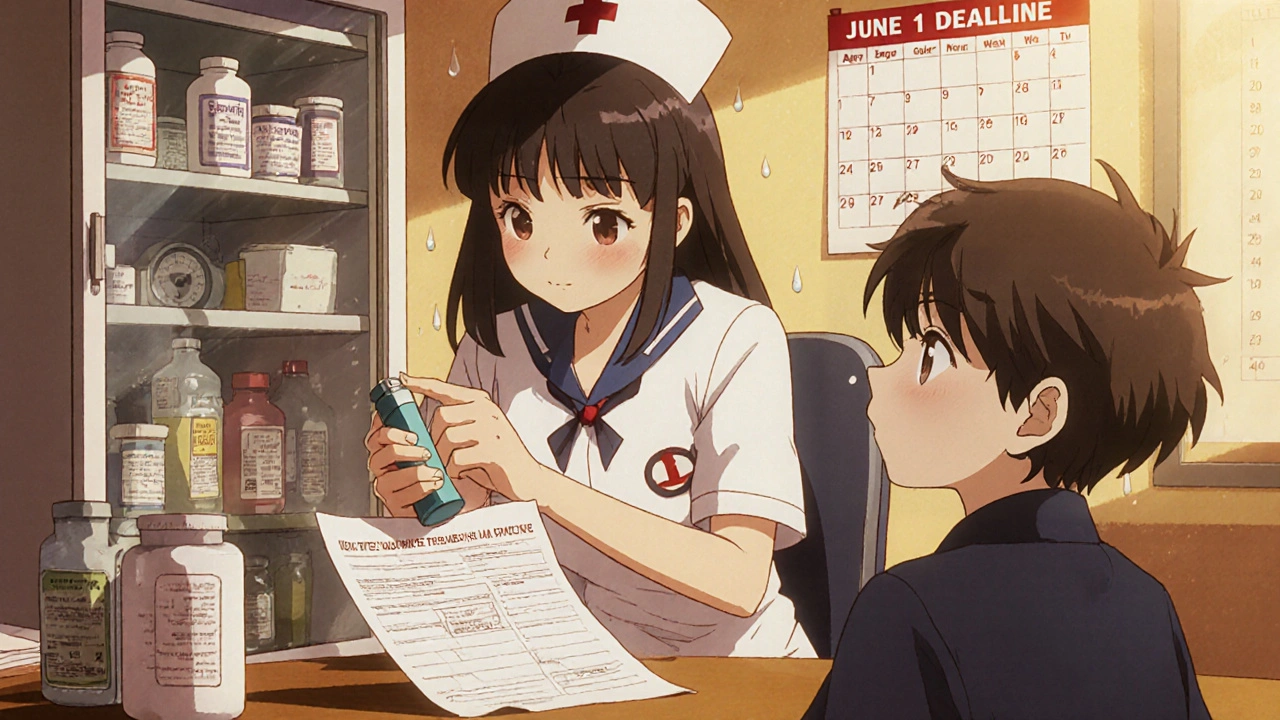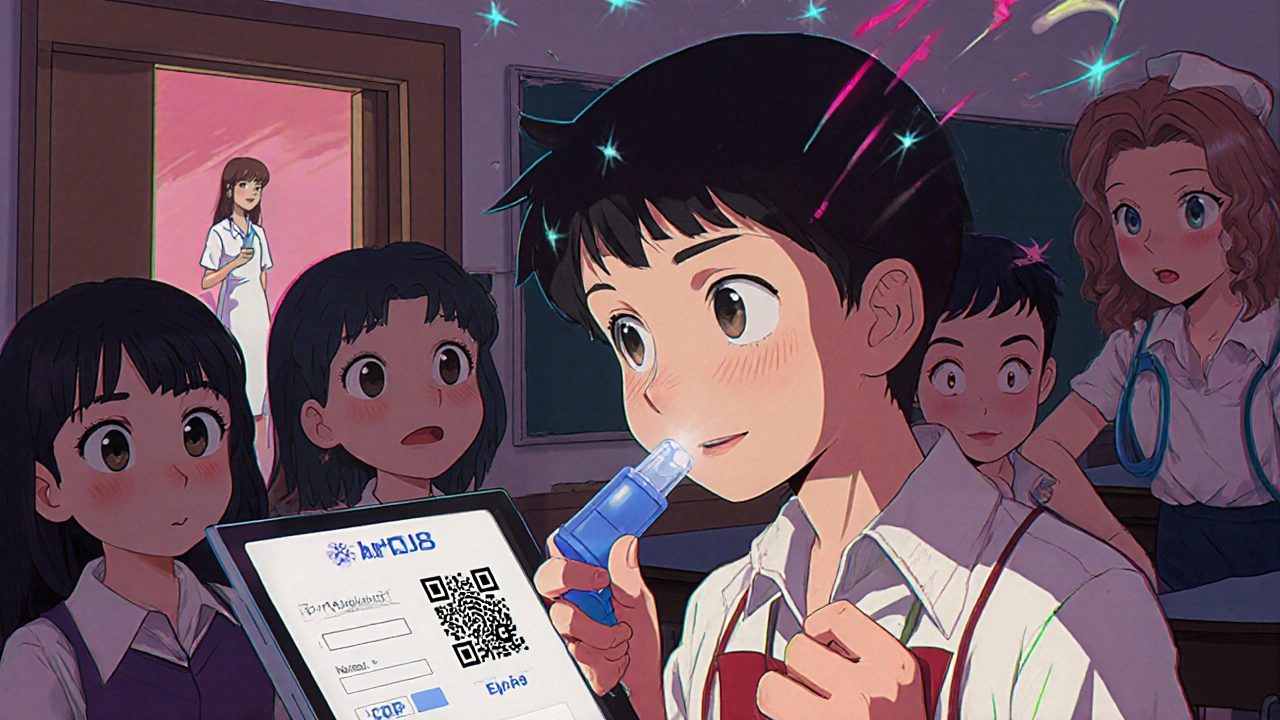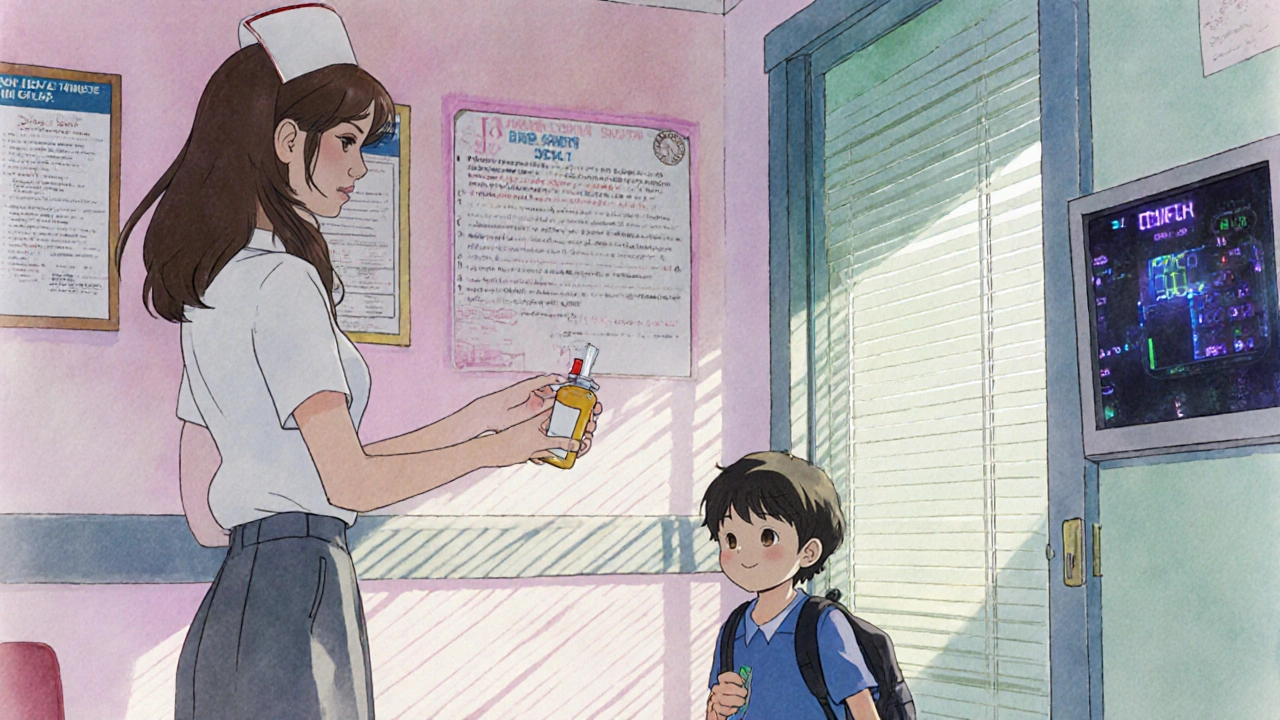What You Need to Know Before Your Child Takes Medication at School
If your child needs to take medicine during school hours-whether it’s for asthma, ADHD, allergies, or something else-you’re not alone. About half of all school-aged kids in the U.S. take at least one prescription or over-the-counter medication daily. That means schools are handling more meds than ever before. But giving a child medicine isn’t as simple as handing over a pill bottle. There are rules. There are forms. There are safety checks. And if you skip even one step, your child could miss a dose-or worse, get the wrong one.
The good news? When done right, school medication administration reduces errors by up to 75%. That’s not magic. It’s structure. And as a parent, you’re the most important part of that structure.
The 5 Rights: The Foundation of Safe Medication Use at School
Every school nurse, teacher, and aide trained in medication administration learns the same five rules. They’re called the 5 Rights. If you understand these, you’ll know exactly what to expect-and what to demand-from the school.
- Right student: The medication must go to your child, and only your child. Schools use name tags, ID checks, and sometimes electronic systems to confirm this.
- Right medication: The pill, inhaler, or liquid must match exactly what the doctor prescribed. No substitutions. No "it looks similar enough" decisions.
- Right dose: A half-pill isn’t a quarter-pill. A spray isn’t a drop. Dosing must be exact. Overdosing can be dangerous. Underdosing won’t help.
- Right route: Is it swallowed? Inhaled? Injected? Applied to the skin? The method matters. Giving a nasal spray orally won’t work-and could cause harm.
- Right time: Medications are timed for a reason. Antibiotics need spacing. Insulin needs meals. ADHD meds need to kick in before lunch. Schools can give meds within a 30-minute window before or after the scheduled time-unless the doctor says otherwise.
These aren’t suggestions. They’re the law in most states. If your child’s school skips any of these, you have the right to ask why.
What Paperwork You Must Complete (And When)
You can’t just drop off a bottle of medicine and walk away. Every school requires two signed forms before any medication is given.
- Physician/Parent Authorization Form: This form must be filled out by your child’s doctor. It must include: your child’s full name, the exact medication name, dosage, route, timing, duration, possible side effects, and the doctor’s license number. Many states, including New York, require this form to be renewed every year.
- Parent Consent Form: This is your signature saying you agree to the school giving the medication. Some schools call it a Medication Administration Form (MAF). Don’t assume the school has it. Don’t wait until the first day of school. New York City Public Schools recommends submitting forms by June 1 for the next school year. If you wait, your child might miss a week-or more-of needed treatment.
And here’s something many parents don’t realize: the medicine bottle label is not enough. Even if it has your child’s name on it, schools won’t accept it as official documentation. The form must come from the doctor’s office.
How to Deliver Medication to School
Never let your child carry their own medication to school-unless they’re approved to self-administer.
All medications must be delivered by a parent or guardian. The school nurse will check the container against the paperwork, sign for receipt, and store it properly. This isn’t optional. It’s a safety rule.
Here’s what the container must have:
- The original manufacturer’s label with your child’s name
- Expiration date (no expired meds allowed)
- Clear dosage instructions
- Full name of the medication
For inhalers, epinephrine auto-injectors, or liquid meds, make sure the device is intact and sealed. Schools won’t accept opened bottles or broken devices.
Plan to spend at least 15 minutes at the nurse’s office on the first day. Bring all forms, all meds, and all questions. Ask: "Where will this be stored? Who will give it? What happens if my child refuses?"

Storage: Where Your Child’s Medicine Is Kept
Medications aren’t left on a desk or in a drawer. They’re locked up.
Most schools keep meds in a locked cabinet, often in the nurse’s office. Refrigerated meds-like insulin or some antibiotics-must be stored between 2°C and 8°C (36°F-46°F) in a dedicated fridge, never mixed with food. Some schools now use electronic medication records (eMARs), which track who gave what, when, and by whom. Over 89% of public schools use these systems now, cutting documentation errors by more than half.
If your child needs an inhaler or EpiPen and is approved to self-carry, the school will still require a separate form. In New York, both the doctor and parent must sign off. In California, the student must demonstrate they can use it correctly under supervision. Don’t assume your child is ready. Ask the nurse to evaluate them.
What Happens If Your Child Refuses to Take Their Medicine?
It happens. Kids are kids. They’re scared. They don’t want to stand out. They’re tired of being different.
Schools have protocols for this. If your child refuses, the nurse will try to talk to them. If they still won’t take it, the school will call you immediately. You’ll be asked to come in or give permission for the nurse to try again later.
Some parents think: "They’ll take it at home." But if your child misses a dose during school hours, it can throw off their whole day. A child with asthma who skips their inhaler before gym class could end up in the ER. A child with ADHD who misses their dose might have a meltdown, get sent home, or fall behind in class.
That’s why experts say: parent consent and student assent are both critical. Talk to your child. Explain why they need the medicine. Let them ask questions. The more they understand, the less they’ll resist. Studies show kids who understand their treatment miss 32% fewer doses.
Changes, Reactions, and Emergencies
Your child’s needs can change. A new side effect. A dosage adjustment. A different medication.
If anything changes at home-new medicine, new dose, new doctor-you must tell the school immediately. According to the National Association of School Nurses, failure to update the school is linked to 18% of all medication errors.
And if your child has a reaction at school? The nurse will follow the emergency plan you and the doctor created. That’s why you must list possible side effects on the form. Is the medicine likely to cause drowsiness? Dizziness? Rash? The school needs to know what to watch for.

End of the School Year: Don’t Forget This Step
When the school year ends, you must pick up all unused medication.
Frederick County Schools, New York State, and most districts across the country have the same rule: No medication stays over summer. Not even a single pill. Not even if it’s still good.
Why? Safety. Storage limits. Liability. The school can’t keep your child’s meds indefinitely. If you don’t retrieve them by August 31 in New York, or by the last day of school in other districts, they’ll be disposed of properly.
Don’t assume the nurse will remind you. Don’t wait until the last week. Mark it on your calendar. Go in. Sign the release form. Take it home.
What’s Changing in School Medication Safety
Things are getting better-and more complex.
More kids are being diagnosed with mental health conditions. Autoimmune disorders are rising. New treatments like transdermal patches and auto-injectable biologics are appearing in classrooms. Schools are preparing.
Some districts are testing apps that text parents when their child’s medicine is given. In California, early results show a 27% drop in parent calls asking, "Did they take it?"
By 2026, many states plan to standardize digital forms. By 2028, some may use biometric checks-like fingerprint scans-to make sure the right child gets the right medicine. It sounds high-tech, but it’s just good safety.
The goal isn’t to make things harder. It’s to make them safer. And you’re not just a parent. You’re a partner in that safety.
Final Checklist for Parents
Before the first day of school, make sure you’ve done this:
- Completed and signed the Physician/Parent Authorization Form with the doctor’s license number
- Submitted the form by June 1 (if your district recommends it)
- Delivered all medication in original, labeled containers
- Confirmed storage location and who will administer the meds
- Talked to your child about why they need the medicine
- Updated the school immediately if anything changes
- Planned to pick up all meds before summer ends
If you’ve checked all these boxes, you’ve done your part. Now the school can do theirs.
Frequently Asked Questions
Can my child carry their own inhaler or EpiPen to school?
Yes-but only if both the doctor and parent sign a special self-administration form. Schools require proof the child can use the device correctly. In New York, this requires a written order from the doctor. In California, the child must demonstrate proper use in front of the school nurse. Never assume your child can carry it without permission.
What if my child’s doctor doesn’t provide the required form?
Most doctors’ offices have the standard forms ready. If they don’t, ask for a letter on letterhead that includes: the child’s full name, medication name, dosage, route, timing, duration, side effects, and the doctor’s license number. Many schools accept this as long as it’s signed and dated. Call the school nurse first-they’ll tell you exactly what they need.
Are over-the-counter meds like ibuprofen allowed at school?
Yes, but they still require a parent consent form and original packaging. Even Tylenol or Advil must be brought in the manufacturer’s bottle with clear dosage instructions. Some schools require a doctor’s note even for OTC meds. Never send a pill from a home container.
How often do I need to renew the medication form?
Most states require annual renewal. In New York, all medication orders expire after one school year. Even if your child’s prescription lasts longer, the school will stop giving the medicine unless you submit a new form. Mark your calendar for June or July each year.
What if the school refuses to give my child their medicine?
If the school refuses because paperwork is missing, fix it immediately. If they refuse without reason, contact the school nurse and principal. If that doesn’t work, you can file a complaint with your state’s Department of Education. The U.S. Department of Education has received over 120 complaints in the past five years about schools failing to administer prescribed medication. You have rights under federal disability laws if the medicine is needed for a health condition.

Linda Migdal
November 25, 2025 AT 16:01And stop letting parents "bring it in"-that’s how errors happen. Centralized pharmacy distribution to schools. Full stop.
ANN JACOBS
November 25, 2025 AT 20:37Nnaemeka Kingsley
November 26, 2025 AT 16:14Kshitij Shah
November 27, 2025 AT 07:00Also, why does the school need to know the doctor’s license number? Are we building a pharmaceutical registry or just trying to make parents feel guilty?
Sean McCarthy
November 28, 2025 AT 20:48Kay Lam
November 29, 2025 AT 04:38Walker Alvey
November 30, 2025 AT 06:10Adrian Barnes
December 1, 2025 AT 02:24Declan Flynn Fitness
December 1, 2025 AT 09:25Michelle Smyth
December 3, 2025 AT 01:11Patrick Smyth
December 3, 2025 AT 09:57patrick sui
December 3, 2025 AT 11:25Declan O Reilly
December 5, 2025 AT 00:31Conor Forde
December 5, 2025 AT 05:49